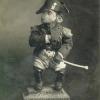Could you please tell me if having a partition for C drive (containing OS only) along with a partition for D drive (containing data only) causes higher wear and tear?
I have been told that it is better for the longetivity of a hard drive if there are no partitions.
I recently had a HDD fail that had 3 partitions, ie on 80 gig Maxtor IDE. I also had a 200 gig WD SATA. I now have an extra 2 of WD 320 gig SATA drives, one of which has my newly loaded WIN XP pro. The only thing is that initially loading win XP, the only option available was to accept a default maximum C drive partition of approx 130 gig. When I loaded SP2, my system could then see the remaining unallocated space on that hard drive.
If I desire to have the full 320 gig available as my c drive, I would have to build a slipstream version of win XP containing SP2 but I am not sure the time and effort would be worth it.
















 Sign In
Sign In Create Account
Create Account

